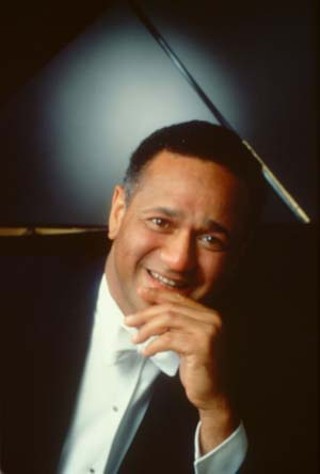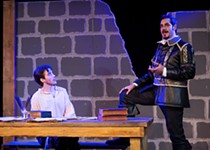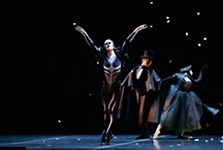Austin Symphony Orchestra with Andre Watts
Maestro Peter Bay zeroed in on early 20th century France, and the results were magnificent
Reviewed by Michael Kellerman, Fri., March 21, 2008

Austin Symphony Orchestra With André Watts
Riverbend Centre, March 15
For the Austin Symphony Orchestra's midseason performance, Maestro Peter Bay zeroed in on early 20th century France to present the vast variety of its composers' musical styles with a program that was at once eclectic and unmistakably French.
To open, Bay chose Jean Françaix's light, neoclassical L'Horloge de Flore, written for solo oboe and orchestra. The piece was an opportunity for Beth Sanders, in her 24th year as principal oboist of the ASO, to take center stage. Sanders' performance was delightful and technically precise.
To follow was Albert Roussel's Suite in F, a dense, lush work that evokes the Jazz Age streets of Paris. Roussel's score flirts with dissonance but remains a step away from traditional tonality at all times, an effect that is most apparent in the final movement, an exciting and entertaining gigue. The ensemble handled its technical flourishes and driving rhythms with encouraging ease.
For the second act, Bay pulled out two masterworks of the 20th century French canon and invited one of the music world's superstar virtuosos to the Riverbend Centre stage.
Pianist André Watts has wracked up practically every honor there is to earn in the classical music world. As an example of the enormity of his career, in 2007, Watts celebrated not only his 60th birthday but also the 50th anniversary of his professional debut with the Philadelphia Orchestra. A quick calculation inspires awe.
Watts took the stage in a deep-blue tails tuxedo, a choice that set the tone for the performance to follow: refined, colorful, and entirely unique. On the bill was Camille Saint-Saëns' wonderful second piano concerto, a work that achieves a tricky balance: It is virtuosic and exciting but without being showy or overwrought. And what better instrument to engage than Watts' hands, which seemed to dance across the keyboard? From the flourishes of the opening bars, it was clear this would be a memorable experience. Watts' light touch has the effect of putting the audience at ease, a difficult feat considering the intense technical and lyrical demands of the concerto.
In the first movement, a gorgeous allegro, it was clear the orchestra itself was inspired by its guest's flawless technique. The energy throughout – from Bay's grinning joy to the way Watts swayed in rhythm to the furious tarantella in the last movement – was impossible to ignore. As the concerto came to its fiery climax, the audience seemed to lean forward en masse and prepare to celebrate.
In this era of the ubiquitous standing ovation, where the gesture has become an almost trite reflex, it was thrilling to witness the real McCoy following Watts' last notes. The applause was spontaneous, soaring, and most importantly, thoroughly meaningful.
Afterward, an anticipation settled into the audience: How would the ensemble follow such a triumph? Bay and his ensemble answered with Claude Debussy's La Mer. A symphonic tone poem inspired by the ocean, the masterwork is a tremendously challenging piece, crowded with rhythmic and textural oddities, as well as Debussy's trademark command to create an ethereal and organic sonic experience. The members of the ASO truly went for it, and by the time the lush chorale returned to close out the piece, there was no doubt they were up to the challenge. This was a fully realized, mature, and majestic performance, surely one of the finest Austin has seen from its 97-year-old orchestra. The second standing ovation of the night was, in short, awesome.
As the ASO moves into the Long Center with great anticipation, much is being said about the limitations of the Riverbend Centre: its location, limited acoustics, the lack of individual seats. For this performance, though, the audience intimately wrapped around the stage, each with a fantastic view, a special shout-out is due the centre for playing host to the symphony during its season without a home. It is a unique and exciting setting, which only added to the grandeur of a magnificent performance.










